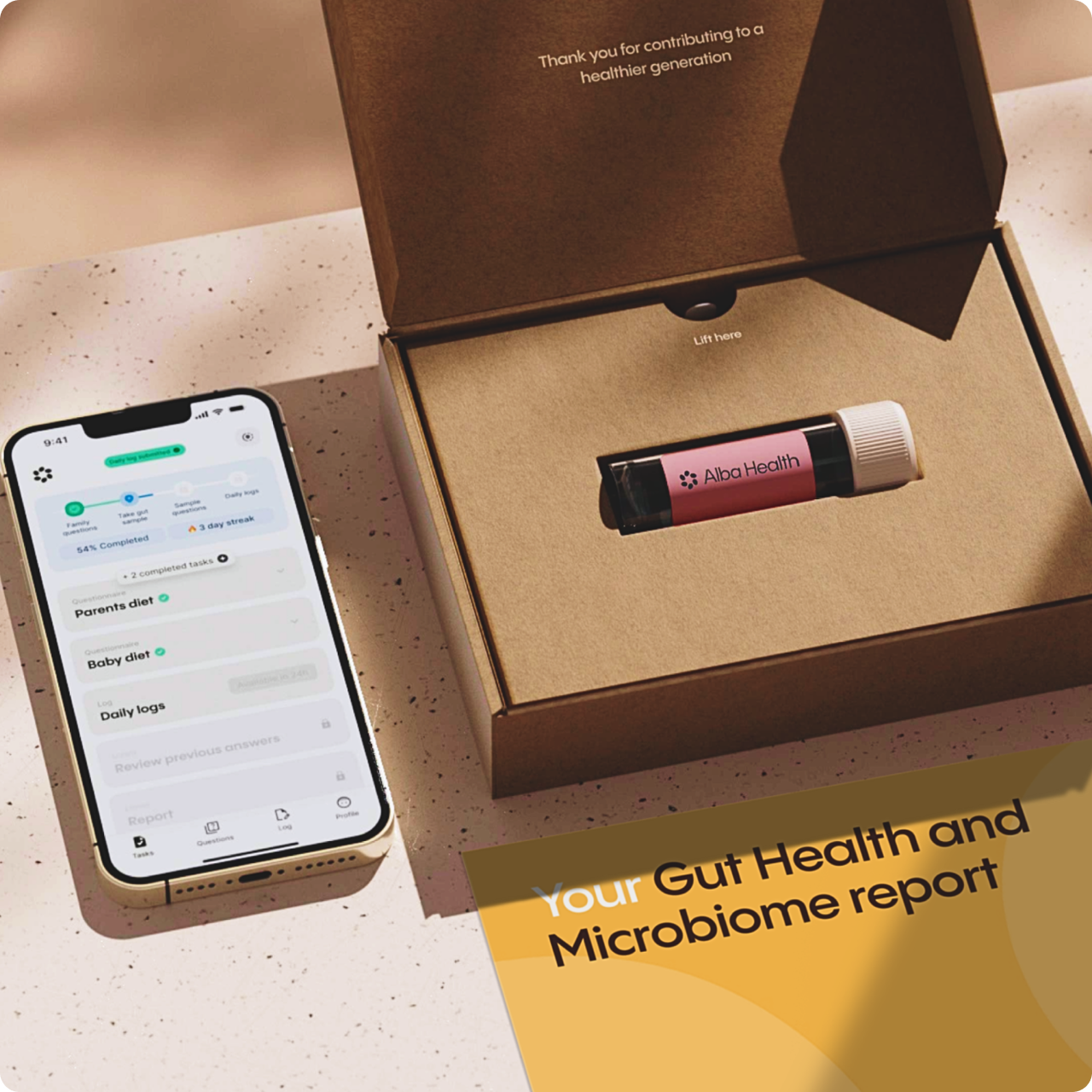
Learn more with pediatrician Erica Bonns
The source of your child's colic could lie in their gut microbiome
Inconsolable nights are everyday life for families with babies living with colic. Thanks to new research within gut health, there is help to be found.
An imbalance in the gut microbiome has been shown to impact children's health in ways not previously known. Thanks to new science, we can now assess whether your child’s gut flora is likely contributing to their colic and stomach problems.
How gut health affects colic in babies
Your baby’s gut health plays a key role in digestion and comfort. Research suggests an imbalance in gut bacteria may contribute to colic. When the gut microbiome is out of balance, it can:
- Increase gas and bloating, leading to tummy pain and fussiness.
- Make digestion less efficient, contributing to discomfort.
- Affect the gut-brain connection, which may play a role in excessive crying.
- Trigger mild inflammation that could worsen colic symptoms.
If your baby is experiencing persistent colic, supporting their gut health may help reduce symptoms and bring relief.

Developed by scientists from Karolinska, KTH and Uppsala University
You're not alone. Our gut health test has helped many parents with their child's colic.
Colic is challenging for both babies and parents. Let Alba help you uncover the root cause of your baby’s colic and get expert advice tailored to their needs.


Paediatrician and Medical Advisor at Alba
MD, Karolinska Institutet
Dr. Erica Bonns
"The exact cause of colic remains unknown, but studies show that certain probiotics can help alleviate its symptoms in babies."


THERESE, VERIFIED ALBA USER
“I recommend it to everyone I talk to because it has made such a big difference for us.”
“Our baby had gut issues from the start. When we finally chose to try Alba Health, things started to fall into place, and today, at 7 months old, our baby is doing much better. I highly recommend everyone consider taking a test, as gut health has proven to be so important, especially for babies with colic or similar issues.”
FAQ
Colic refers to severe, often fluctuating abdominal pain in infants, which is usually caused by gas, digestive discomfort, or a still-developing gut. It’s most common in babies aged 2 weeks to 4 months. The common signs include:
- Excessive crying or fussiness: Usually occurring in the late afternoon or evening.
- Tightening of the abdomen: The baby may pull their legs up toward their belly, indicating discomfort.
- Clenched fists: Can serve asa sign of distress or pain.
- Gassy or bloated appearance: The baby might pass gas or have difficulty with bowel movements.
In children, it depends on the age. The baby's microbiome is constantly evolving from birth to adulthood, so monitoring its trajectory and development over time is even more informative than looking at only one snapshot.
From one microbiome test, you will discover:
- Levels of friendly bacteria, promoting healthy development
- Levels of unfriendly bacteria, as some types of bacteria are known to be unfriendly when in large share, being able to cause infections and inhibit friendly bacteria
- Gut microbiome diversity, which is associated to health and wellbeing
- Associations with constipation, from our clinical study in Sweden
- Levels of bacteria promoting immune system development and associated to lower risk of allergy and eczema
- Levels of bacteria promoting metabolic health and associated to healthy weight
- Levels of bacteria promoting brain health and cognition
- Most importantly, you will receive a set of personalized recommendations covering diet, environmental exposure, behavior and probiotic supplements (if needed) reviewed by our medical experts and discussed with you in a 1:1 consultation with a certified Nutrition & Health Coach. You will also receive 3 simple example recipes that promote optimal gut health.
References: Stewart CJ, Ajami NJ, O'Brien JL, Hutchinson DS, Smith DP, Wong MC, Ross MC, Lloyd RE, Doddapaneni H, Metcalf GA, Muzny D, Gibbs RA, Vatanen T, Huttenhower C, Xavier RJ, Rewers M, Hagopian W, Toppari J, Ziegler AG, She JX, Akolkar B, Lernmark A, Hyoty H, Vehik K, Krischer JP, Petrosino JF. Temporal development of the gut microbiome in early childhood from the TEDDY study. Nature (2018);
We are inhabited by 39 trillions of microorganisms that live on our skin, mouth, genitals, respiratory tract and gut. They are bacteria, fungi, viruses and parasites and they are essential for our health - in fact, we couldn’t survive without them! The gut microbiome is the collection of all of our microbes in the gut, and their DNA. It has a fundamental role in digestion, immune system health and brain health. Imbalances in the gut microbiome have been associated with most chronic diseases like obesity, diabetes, asthma, celiac disease and even cancer.
References: Ghosh, T.S., Shanahan, F. & O’Toole, P.W. The gut microbiome as a modulator of healthy ageing. Nat Rev Gastroenterol Hepatol (2022); Vijay, A., Valdes, A.M. Role of the gut microbiome in chronic diseases: a narrative review. Eur J Clin Nutr 76, 489–501 (2022).
From a stool sample, we are able to collect the DNA of all gut microbes. From their DNA we can tell exactly which bacteria are present and what they are doing in your gut. We analyze bacterial DNA only, and we do not analyze your own DNA.
More questions?
Contact us




Shaping a healthier tomorrow
Join us in advancing gut health understanding for the generations to come.



